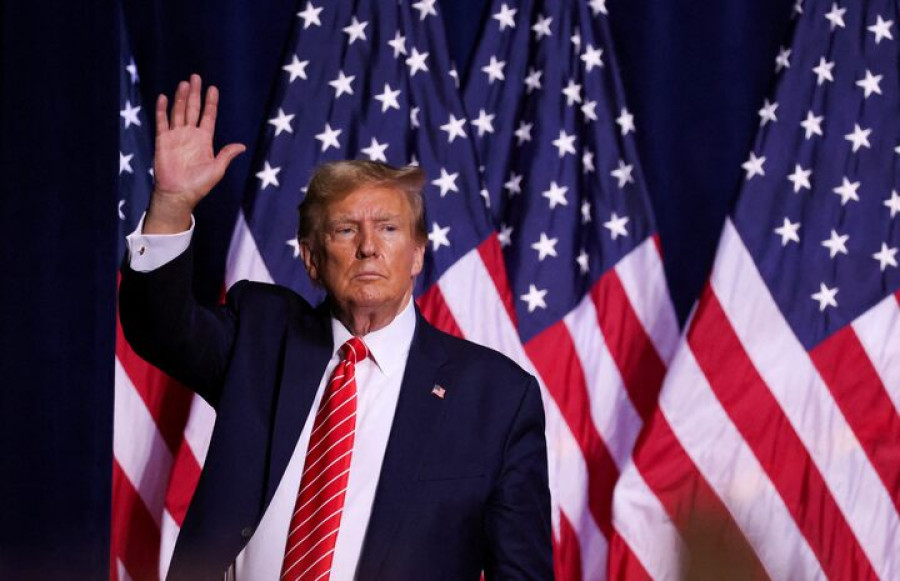Columns
Overstated risks of Trump 2.0
When all is said and done, Trump will fulfil a diluted version of his ambitious campaign promises.
Paban Raj Pandey
Donald Trump is set to return to the White House on January 20, even as Americans principally and the world in general wait with bated breath if he succeeds in fulfilling all his campaign promises. The issues he ran on in a divided nation along ideological lines run the gamut from taxes and tariffs to deportation and deregulation. Americans have given him—or the Republicans—an “unprecedented and powerful mandate.” Not only did they win the presidency but also the Senate and the House of Representatives. It is impossible to fulfil every promise a politician makes, but if Trump manages to deliver on the major ones he made, there will be repercussions for the United States and the world.
For a 78-year-old, Trump pulled off a stunning comeback. He won against Hillary Clinton in 2016, although he lost the popular vote. In 2020, President Joe Biden prevailed over him, with Trump falsely claiming that he had won. Soon followed the January 2021 attack on the US Capitol while Biden was president and later a litany of court cases, including convictions. In July, Trump survived an assassination attempt during a campaign rally, only to be topped by his defeat of Vice President Kamala Harris in the presidential election early this month. This time around, he won the popular vote and 312 of 538 electoral votes—a landslide victory. This probably emboldens him to go after his agenda.
Trump made several extreme campaign promises and won. But he does not necessarily have to prove to his base that he means what he says because he cannot be elected president again in 2028. This factor probably played a role after he won in 2016, but maybe not now. As outlined in the 22nd Amendment of the US Constitution, a person can serve two four-year terms as president, even if the terms are not consecutive. If he instead worries more about his legacy of being a man of his word, anti-China rhetoric will spike, budget deficit will soar, undocumented immigrants will live in fear, and there will be trade wars. As elevated as these risks are, odds favour things do not get as bad as many dread. Here is why.
Populist campaign promises
Trump has said he has “no choice” but to pursue mass deportation. It is hard to put a number on undocumented immigrants. Various estimates put it at around 11 million. You cannot just willy-nilly round up millions of people before facing logistical and operational problems. Most of them do the work that many Americans avoid, like farm and construction jobs. They also tend to spend a good chunk of their income and do not apply for government benefits. At a time when the US unemployment rate dipped to 4.1 percent in October, it is impossible to fill all these jobs unless wages go up appreciably. Once business starts lobbying against it, chances are there will be face-saving deportation but not by the millions.
If you run a surplus, you are ripping us off—in essence, that is how Trump views trade. Often called the world’s factory, China runs a huge surplus with the US and the European Union and has become the world’s second largest economy. China hawks in the US view tariffs as a tool to rebalance this relationship. Trump has floated an up to 20 percent tariff on all goods coming into the US and at least 60 percent on Chinese goods. If this materialises, there will be retaliatory tariffs and likely a full-scale trade war. A businessman-turned-politician, Trump knows this and would not want another depression under his watch. Tariffs will be used as a negotiating ploy to wiggle better deals out of its trade partners.
The US’s fiscal path is unsustainable. Under Biden’s watch, the federal budget deficit is on course for well over $7 trillion, coming on the heels of nearly $6 trillion in red ink under Trump’s before that. The national debt stands at $36 trillion, up from just under $20 trillion when Trump began his first presidency. The American economy currently is doing just fine. Trump still wants to stimulate by cutting taxes, including by lowering the corporate tax rate from 21 percent to 15 percent and extending the tax cuts from 2017 when he was president, among others. The populist promises are too big and obviously come with a hefty price tag, which deficit hawks in Trump’s own party are likely to baulk at.
Signals of big policy shift
Republicans, as conservatives, like to label themselves as a party of less regulation and small government. Trump made fewer campaign promises relating to regulation than he did in 2016. Post-election, he announced that Elon Musk in conjunction with Vivek Ramaswamy would head up the new Department of Government Efficiency. Earlier, at a rally last month, Musk said it would be possible to cut at least $2 trillion from US government spending. This is 30 percent of $6.75 trillion the government spent in the last fiscal year through September. Savings to such a degree are impossible without wrecking the delivery of government functions, inciting public outrage. Mid-term elections are only two years away.
When all is said and done, Trump will fulfil a diluted version of his ambitious campaign promises. The prevailing fear over the four issues mentioned above is overstated. This does not mean there are no risks elsewhere. There are. Under the first Trump administration, the US pulled out of the Paris climate agreement. Trump will probably do it again. It is also possible regulations meant to restrain climate change will be rolled back, raising risks of severe environmental consequences. Concurrently, he is expected to overhaul the country’s financial regulators, including the Securities and Exchange Commission; less demanding financial oversight may sow the seeds of bubbles.
During his first term, Trump did not have the smoothest of relationships with his generals; going by his pick of Pete Hegseth for defense secretary, a shakeup within the Pentagon is imminent. And, even if he negotiates a deal between Russia and Ukraine, it is unlikely the Middle East conflict gets resolved; Senator Marco Rubio, nominated to serve as secretary of state, is a die-hard supporter of Israel. Worse, Israel gets the green light to go after Iran’s nuclear facilities. Trump also wants a say in monetary policy; should Congress legislate this, markets will puke. Elections by nature have consequences. Trump’s win—and subsequent policy—stand to send ripples well beyond the shores of America.




 15.12°C Kathmandu
15.12°C Kathmandu















